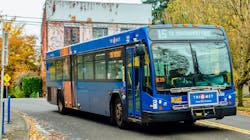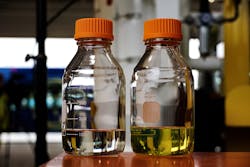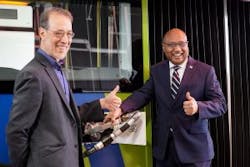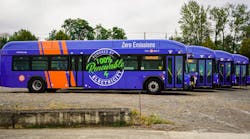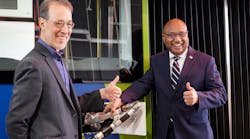TriMet’s switch to renewable diesel successful; agency hopes to reach net-zero emissions by 2050
TriMet’s nearly 700 fixed-route buses have run on R99, a blend of 99 percent renewable diesel and one percent petroleum since December 2021. The agency’s LIFT paratransit vans and buses, along with their WES commuter rail trains made the switch to R99 in May of 2022. The agency says they have used more than five million gallons of R99 in the past year as a part of their goal to reach net-zero emissions by 2050.
The move to renewable diesel, combined with the agency’s shift to renewable electricity for the MAX light- rail system and all TriMet-owned facilities in June 2021, reduced TriMet’s greenhouse gas emissions by nearly 70 percent. TriMet estimate these climate actions will help TriMet avoid more than 193 million pounds of greenhouse gas emissions each year, which is equivalent to taking almost 19,000 automobiles off the road annually, according to the Environmental Protection Agency (EPA).
What is renewable diesel?
Renewable diesel is chemically identical to petroleum, but it contains nearly no fossil carbon. It is made from 100 percent renewable and sustainable resources like natural fats, vegetable oils and greases. Also referred to as renewable hydrocarbon diesel, it produces fewer emissions, resulting in a cleaner, low-carbon fuel.
R99 replaced the B5 biodiesel blend TriMet had been using in their buses since 2006. Unlike higher concentrations of biodiesel, renewable diesel requires no changes to engines. Renewable diesel is processed in the same way as petroleum and performs better than biodiesel in cold air. In addition, it requires no blending and burns cleaner than biodiesel or petroleum diesel.
Benefits add up
As renewable diesel burns much cleaner than traditional diesel fuel as well as biodiesel, TriMet expects to see significant maintenance cost savings over time. Since making the transition to R99 in their fixed-route fleet one year ago, the agency has experienced a notable decrease in maintenance issues related to their buses’ emissions systems. Renewable diesel is easier on the exhaust after-treatment systems that are installed on TriMet buses, which lowers the time and cost required to maintain the buses. TriMet estimates annual maintenance cost savings could reach as much as $100,000 per year.
The road to net-zero emissions
As TriMet pursues net-zero emissions by 2050, the agency’s adoption of renewable energy helps meet milestones defined in their Climate Action Plan. By purchasing renewable electricity and renewable diesel in the past year, TriMet estimates exceeding their 2022 goal for a 60 percent reduction in greenhouse gas emissions (from a 2020 baseline) by about 10 percent.
TriMet continues to test and vet electric bus technologies in the agency’s move to a zero-emissions bus fleet by 2040. Earlier this year, TriMet made our first bulk purchase of electric buses, 24 long-range battery-electric buses manufactured by Gillig. The buses will start arriving in 2023 and will expand TriMet’s current electric bus fleet to 34 vehicles by mid-2024.
TriMet continues to explore the potential of emerging technologies, including four diesel-to-electric conversion buses, and what is believed to be the world’s first 60-foot, articulated bus converted to 100 percent electric.
